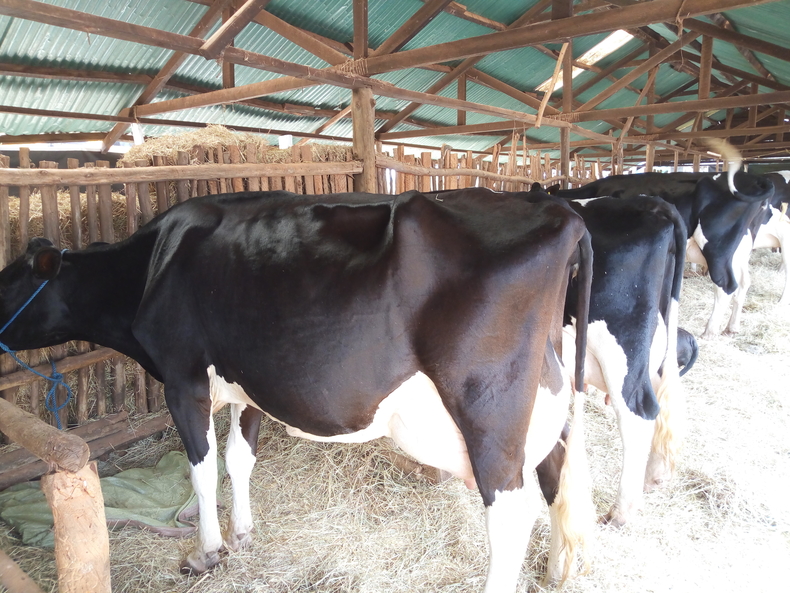 Part of Maina's dairy farm in Kawangware. He milks 125 liters daily from his five lactating cows selling a litre at Sh60 directly to consumers. Photo: Zablon Oyugi, Farmbiz Africa.
Part of Maina's dairy farm in Kawangware. He milks 125 liters daily from his five lactating cows selling a litre at Sh60 directly to consumers. Photo: Zablon Oyugi, Farmbiz Africa.
Dennis Maina, a dairy farmer from Kawangware which is about 15km west of Nairobi’s city centre is going against key challenges such as limited space and feeds in the urban setting to establish the venture which is currently earning him five times more as compared to the returns he got from building construction materials sales.
He started the venture in 2013 after selling all the materials he had in his store and realized Sh600,000 which became his capital he used to buy his first two cows and build then a shed.
“My main challenge is access to consistent feeds and limited storage space for feeds in this area. I often hire a truck at Sh5000 to Sh10,000 to purchase bale from Naivasha farms for daily feeding and future use, where I keep them safely above the cow shed which acts as a storage room,” said Maina.
A bale of hay goes for Sh200 and he normally buys up to 100 bales in a single trip.
RELATED CONTENT: Former driver becomes award winning dairy goat farmer
Before, Maina employed a casual worker who collected corn husks from the Kawangware market maize sellers and other plants feeds for the animals.
He would mixe them with dairy meal and lucerne to bring out the required nutrition value for the cows. However, this was not easy given he was coming from a different business which was not related to farming at all.
He was therefore forced to learn his first skills on how to manage his dairy farm from an established farmer in Githunguri where he bought his first two dairy cows at Sh100,000 each and who offered him advice and experiences on how to improve his production.
RELATED CONTENT: Homemade dairy feeds cuts milk production costs by a third
In addition, he has also been attending various dairy livestock seminars and shows through which he was introduced to a professional veterinary who helps him in controlling and maintaining good health of the animals paying him between Sh3,000 to Sh9,000 depending on the nature of work.
“To increase my production, my veterinary advised me to improve the breeds to top pedigrees from tried and tested fertilization of high breed imported semen through Artificial Insemination process over natural mating which has really bore fruits.
“I import semen from Brazil at Sh9,000 per tube to service my cows since I understood they have the best breeds through workshops I have attended,” said Maina.
RELATED CONTENT: Rearing five dairy goats is 45 per cent more profitable than a dairy cow
From his two cows, he now has a herd of 11. In this, he has eight Friesian cows from which he milks five while three are expectant and about to calf, two young bulls and a calf which he houses within a 16 by 24 feet cowshed, he constructed at Sh100,000.
His initial thought was to sell his produce through milk dispensing machines commonly known as (milk ATM) which works like an Automated Teller Machine (ATM) that allows consumers to purchase milk from a mechanized nozzle. However, he realized that milk demand was high from direct consumers in his neighborhood and would command a higher fee of Sh60 per liter compared to Sh45 for the ATM vendors.
RELATED CONTENT: Star farmer: Dairy farming lifts Rift Valley farmer to national and international stardom
From Sh1, 500 a day he used to earn in his construction materials business, Maina is currently earning roughly Sh7,500 a day from milk sales milking 125 liters daily from his five dairy cows.
In future, he plans to purchase a spacious land in Ndeiya near Kikuyu town to relocate his cows but he will still supply milk to his loyal Kawangware customers by using his van purchased from the milk proceeds.
Besides dairy farming, Maina hires out his van through groups interested in going out for leisure purposes such as tours or church outings.
RELATED CONTENT: Lupin seeds mixed with maize offers cheaper dairy feeds and increases milk yields
He encourages young people to try dairy farming since the demand and market is still large than focusing on white collar jobs. “The pay is quite sweet and less tiresome,” he said.
The quantity of milk produced in Kenya dropped from 4.48bn liters in 2016 to 4.1bn in 2017 according to the Kenya National Bureau of Statistics.
For more information, you can contact Maina on +254 723 840 795
















Comments powered by CComment